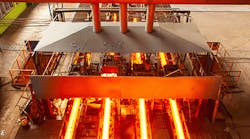Sustainability can't be a one-shot project. It must be investigated, evaluated, prioritized, designed, implemented, maintained and updated over the long haul—just like any other worthwhile process improvement program.
For instance, ArcelorMittal makes steel sheet piles at its Train 2 plant in Belval, Luxembourg, and recently needed to upgrade aging electrical lines and equipment at the 100-year-old site; reduce downtime risks, improve safety and enable energy monitoring; and modernize its medium-voltage (MV) power network to meet sustainability commitments. This included retrofitting unused, outdated MV switchgear and disposing of old parts to comply with environmental rules.
ArcelorMittal worked with Schneider Electric on a modernization performance safety (MPS) audit and services, retrofitted 13 components for the new MV network, added temperature and hygrometry sensors for condition monitoring, and replaced five oil transformers with dry-type transformers with less environmental impact. They also implemented Schneider Electric's EcoStruxure for Metals software with MV circuit breakers, connected power distribution devices and Easery relays for edge control.
This article is part of a series on industrial sustainability. Read more here.
These upgrades at the Train 2 plant allowed ArcelorMittal to save 15-20% on installation, reduce downtime by 5-10%, save 170 equivalent metric tons of CO2, and prevent reprocessing 26 tons of materials. Sensor-based equipment condition monitoring also let the steelmaker's staff track energy use and identify potential faults before they cause downtime. These improvements also increase the facility's installation reliability, energy efficiency, personnel safety and equipment life with predictive maintenance.
"This partnership between AcelorMittal and Schneider Electric will continue with setting up a maintenance plan for high-voltage switchgear and retrofitting low-voltage switchboards," says Sébastien Michon, industrial project engineer at AcelorMittal Belval.
Steve March, EcoSystem sales leader at Schneider Electric, adds that: "There's growing recognition that sustainability isn't just an ethical or moral issue; it also makes good business sense to be responsible with resources and the planet for future generations. This is why Schneider Electric launched its first sustainability barometer back in 2005, and developed a corporate commitment to sustainability, as well as a culture and a global consulting business that continues to help others on their sustainability journeys."
March reports the procedures for improving sustainability are similar to those required when pursuing goals like cybersecurity and process safety. "Sustainability needs to be approached as a program, rather than an individual project, and management must be committed to it," says March. "The steps to sustainability include identifying which measures to make, benchmarking present versus needed performance, assessing where impacts can be made, acting on them, documenting performance, reviewing the next opportunities, and identifying measurements for them, too."
March adds that sustainability programs can also benefit from using the well-known Scope 1, 2 and 3 emissions classifications. They include:
- Scope 1 measures a company's individual process emissions, and determines what can be done about the, such as upgrading equipment to be more sustainable.
- Scope 2 gauges the indirect emissions associated with the generation of electricity, steam, heat or cooling consumed by the company, motivating them to drive efficiency in their energy use, and to change their energy mix.
- Scope 3 covers emissions from assets not controlled by a company, but indirectly impacting its value chain, including transportation in supply and distribution, business travel, and the production of other resources the company is consuming. Addressing these allows companies to make smarter choices in their supply chain, and encourage partners to take similar sustainability actions. These are often the hardest to tackle, but also may represent the largest opportunity for impact.
"In any sustainability program, it's also crucial to secure some early successes, which can show improvement and build momentum for subsequent initiatives," adds March. "In the process industries, sustainability has been voluntary so far. However, in the future, I think we're also going to see more regulations driving sustainability."







